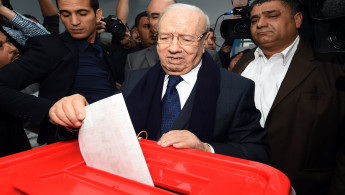Political calculations behind constitutional controversy in Tunisia
Coverage of the Tunisian elections has overshadowed a serious constitutional dispute between the two leading candidates, incumbent President Moncef Marzouki and Beji Caid Essebsi, leader of Nidaa Tounes.
Nidaa Tounes, the largest party in parliament, has rejected Marzouki's invitation to nominate the head of a new government.
According to the constitution, the president has a week after the results of the legislative elections are confirmed to task the largest party with forming a government, and the party nominated has a period of one month to form the government, which can be extended by another month.
However the National Dialogue, a forum bringing together political parties, labour and rights organisations, agreed several weeks ago that requesting a party form the next government should be the responsibility of the president-elect.
Nidaa Tounes' refusal to nominate the head of the next government may be a strategic hedge. If Nidaa Tounes does not nominate a person to form the next government now, then Essebsi, its candidate, has the option of heading the government if he does not win the presidential election.
| Nidaa Tounes has made their own plans, but they violate the constitution, which cannot be overridden by anything else. |
Marzouki and Essebsi are going head-to-head in the second round of the presidential election as Essebsi, the frontrunner, did not manage to win an absolute majority in the first round.
The second round will be held no later than December 28, after all the challenges to the first-round results are decided, which means that the new president may not be announced until late January.
This would bring Essebsi's party right up against its extended deadline of two months for forming a government.
Constitutional crisis
"Nidaa Tounes has made their own calculations and laid their own plans, but they violate the constitution, which cannot be overridden by anything else," the head of Marzouki's presidential campaign, Adnan Munser, told al-Araby al-Jadeed.
Muhsen Marzouk, Nidaa Tounes leader since Essebsi stepped down to run for president, said he thought Marzouki was attempting a political coup, as political parties agreed three weeks ago that only the president-elect could task a party with forming a new government.
The deputy secretary-general of the Tunisian General Labour Union, al-Moulidi Jendoubi, said the organisations sponsoring the national dialogue would hold a session on Monday to look into the letter Marzouki sent to Essebsi asking him to form a government.
However, Munser, the head of Marzouki's campaign, strongly disagreed. "The national dialogue is not a constitutional reference," he told al-Araby. "If it violates the constitution, we do not abide by its opinion."
Constitutional procedures
| The national dialogue will hold a session Monday to look into the letter Marzouki sent to Essebsi asking him to form a government. |
Article 89 of the constitution stipulates that the government comprises the prime minister and other ministers chosen by the prime minister, while ministers of defence and foreign affairs are decided on in consultation with the president.
The government should be formed within a month of a party being tasked, a period which can only be extended once.
If the time period is exceeded without the formation of a government, or if parliament passes a no-confidence vote, the president has ten days to conduct consultations with all political groups to charge the most suitable person with forming a government within a month.
If, however, four months pass without agreeing a new government, the president has the right to dissolve parliament and call for new elections - to be held between 40 to 90 days later.
This is an edited translation from our Arabic edition.



